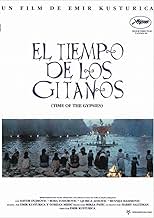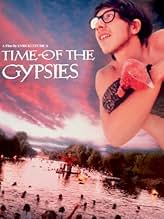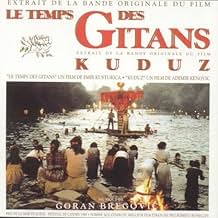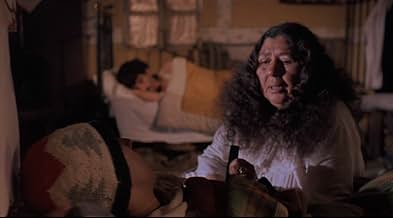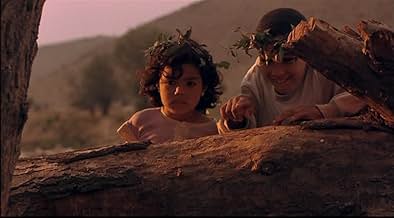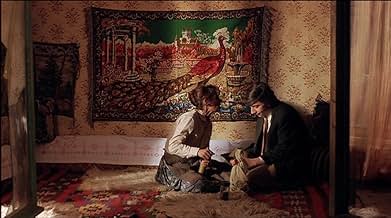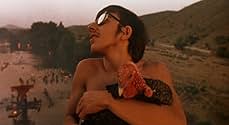NOTE IMDb
8,1/10
34 k
MA NOTE
Dans la région de Sarajevo et en Italie, Perhan est un jeune Rom doté de pouvoirs de télékinésie, séduit par le monde de l'argent facile et de la délinquance qui menace de le détruire ainsi ... Tout lireDans la région de Sarajevo et en Italie, Perhan est un jeune Rom doté de pouvoirs de télékinésie, séduit par le monde de l'argent facile et de la délinquance qui menace de le détruire ainsi que ceux qu'il aime.Dans la région de Sarajevo et en Italie, Perhan est un jeune Rom doté de pouvoirs de télékinésie, séduit par le monde de l'argent facile et de la délinquance qui menace de le détruire ainsi que ceux qu'il aime.
- Réalisation
- Scénario
- Casting principal
- Récompenses
- 3 victoires et 5 nominations au total
Avis à la une
Dom za vesanje is not a movie that an average viewer can comprehend thoroughly, but this doesn't change the fact that it's a masterpiece. Emir Kusturica's storytelling requires some talent, intelligence, and flawless attention to follow and understand correctly, nonetheless it's absolutely unique and fantastic. I would never ever have thought I'd enjoy seeing the world through Yugoslavian gypsies' eyes, but it turned out to be possible so long as it's Kusturica who opens the window. Goran Bregovic's adorable tunes suit the movie perfectly fine too. This movie was one of those that strengthened my opinion which states European movies are a billion times better than American movies. Thanks to Kusturica and Bregovic for producing such a beauty. A perfect 10 for the cast as well.
In 1933 Spanish poet and theater director Federico Garcia Lorca gave a lecture in Buenos Aires titled "Play and Theory of the Duende" in which he addressed the fiery spirit, the 'duende', behind what makes great performance stir the emotions: "The duende, then, is a power, not a work. It is a struggle, not a thought. I have heard an old maestro of the guitar say, "The duende is not in the throat; the duende climbs up inside you, from the soles of the feet.' Meaning this: it is not a question of ability, but of true, living style, of blood, of the most ancient culture, of spontaneous creation."
So okay, Kusturica has mostly come and gone by now. But for a while he really tapped into a valuable duende. I don't know how much of that translates overseas as anything more than feisty craziness, but for those of us here at least he stirred passions that go back in time. He communicated something of the very fabric of our world.
So yes, a living style. Spontaneous creation. Meaning an exaggerated depiction; but one rooted in a recognizable reality, in ancient culture. Reckless people, who consume their beings with spontaneous love or song; the Balkans, meant broadly as a peoples whose common life and toll under Ottoman rule brought them so close, wrote ourselves into this worldview long before Kusturica. Like Goran Bregovic collected old folk songs into new renditions for these films, Kusturica merely translated into cultural images. But oh so well.
Τhis is why Kusturica really spoke to common people here. He reminded them, yes with so much feisty craziness, about a struggle - not a thought - about a life they instinctively have known from blood; so hard that sometimes it makes the eyes well up with tears of joy. About a woe so deep it can only be expressed with dance or a burning cigarette to the arm. About something inexplicable that turns the soul upside down.
Two paths in life then as I see it, both valuable; we should strive to be either Zorbas or Buddhas. That is to say, to either grasp life till it hurts or dispassionately let go. It's about living life fully in the flow of it, and we either vigorously swim or we observe how it all flows away. Everything else is really half-assed stuff, merely trying to stay afloat. Kusturica made films about Zorbas.
All this is well. But if we have perhaps invested part of ourselves in cinema, the images behind, Kusturica, especially here, is a real joy to behold. There was Tarkovsky, who inspired him so much; his stare was austere like those lean Christs we find in Orthodox icons. With Kusturica, Tarkovsky's camera becomes magical song, embodying with ardor of life the joyous sadness of a world turned upside down - so much in the film is about things askew, a house suspended in the air, a man hanging himself from a bell, the image of an inverted Christ in the end.
So one masterful touch is the cinematic flow. The other is how the flow encompasses an entire life; we have a kid who grows up to see how everything in life breaks, a grownup - as this kid - who has already resigned himself to the fact and is broken himself beyond salvation, a young mother who gives birth and dies like the dead mother who is only hearsay now, a second Perhan who will grow up with only hearsay of that young mother but with a father who came back to him. Fascinating stuff, most importantly because the symbolism is not a full circle, neat, precise, but messy, rugged with life.
This is good stuff. It is just not-important enough - in the academic sense - to be really beautiful, and just incomplete enough to allow ourselves to pour into it.
So okay, Kusturica has mostly come and gone by now. But for a while he really tapped into a valuable duende. I don't know how much of that translates overseas as anything more than feisty craziness, but for those of us here at least he stirred passions that go back in time. He communicated something of the very fabric of our world.
So yes, a living style. Spontaneous creation. Meaning an exaggerated depiction; but one rooted in a recognizable reality, in ancient culture. Reckless people, who consume their beings with spontaneous love or song; the Balkans, meant broadly as a peoples whose common life and toll under Ottoman rule brought them so close, wrote ourselves into this worldview long before Kusturica. Like Goran Bregovic collected old folk songs into new renditions for these films, Kusturica merely translated into cultural images. But oh so well.
Τhis is why Kusturica really spoke to common people here. He reminded them, yes with so much feisty craziness, about a struggle - not a thought - about a life they instinctively have known from blood; so hard that sometimes it makes the eyes well up with tears of joy. About a woe so deep it can only be expressed with dance or a burning cigarette to the arm. About something inexplicable that turns the soul upside down.
Two paths in life then as I see it, both valuable; we should strive to be either Zorbas or Buddhas. That is to say, to either grasp life till it hurts or dispassionately let go. It's about living life fully in the flow of it, and we either vigorously swim or we observe how it all flows away. Everything else is really half-assed stuff, merely trying to stay afloat. Kusturica made films about Zorbas.
All this is well. But if we have perhaps invested part of ourselves in cinema, the images behind, Kusturica, especially here, is a real joy to behold. There was Tarkovsky, who inspired him so much; his stare was austere like those lean Christs we find in Orthodox icons. With Kusturica, Tarkovsky's camera becomes magical song, embodying with ardor of life the joyous sadness of a world turned upside down - so much in the film is about things askew, a house suspended in the air, a man hanging himself from a bell, the image of an inverted Christ in the end.
So one masterful touch is the cinematic flow. The other is how the flow encompasses an entire life; we have a kid who grows up to see how everything in life breaks, a grownup - as this kid - who has already resigned himself to the fact and is broken himself beyond salvation, a young mother who gives birth and dies like the dead mother who is only hearsay now, a second Perhan who will grow up with only hearsay of that young mother but with a father who came back to him. Fascinating stuff, most importantly because the symbolism is not a full circle, neat, precise, but messy, rugged with life.
This is good stuff. It is just not-important enough - in the academic sense - to be really beautiful, and just incomplete enough to allow ourselves to pour into it.
Surreal, amazing and absorbing, there are not enough words to explain how great this movie is. I watched it late night on ITV in London from 2am to 4am only to catch a train the next day to Kent, but i don't regreat one moment of it. Am not even going to bother telling you what the film is about, because it really is one of those stories thats best kept to oneslf. Its like a good memory you keep to yourself. I have not seen any of the other Emir Kusturica films, but i will highly recommend this movie for all those that love fantasy, film and a good story.
Dom za vesanje: Approved
Dom za vesanje: Approved
10eilgin
This movie shines as an example of pure art in cinema. So powerful with symbolism and story telling, "Time of Gypsies" delivers amazing performances on acting, settings, musical scores, and overall directing.
In year 1988, this movie was one of the most awaited films in the Istanbul International Film Festival. I was one of the lucky ones who had a ticket for the film. When the show time arrived, it was obvious that there was a problem since the film did not started. A lady from the festival committee came to the stage announcing their appology and explaining what the problem was; they were expecting the copy of the film from the its distributor in USA. Unfortunately there was a logistics problem, so they had to get it directly from Yugoslavia. When the festival organisation put their Yugoslavian translators at work they did not understand which language it was! And a cleaning lady, who was an actual gypsy figured out that the movie was in Gypsy language. So it was not possible to translate it for the festival.
So they offered an apology and refund in case anybody did not want to watch it without subtitles.
Nobody left the theatre. We watched the movie without understanding a word. But, at the end there was a standing ovation at the theatre went on for a couple of minutes.
In year 1988, this movie was one of the most awaited films in the Istanbul International Film Festival. I was one of the lucky ones who had a ticket for the film. When the show time arrived, it was obvious that there was a problem since the film did not started. A lady from the festival committee came to the stage announcing their appology and explaining what the problem was; they were expecting the copy of the film from the its distributor in USA. Unfortunately there was a logistics problem, so they had to get it directly from Yugoslavia. When the festival organisation put their Yugoslavian translators at work they did not understand which language it was! And a cleaning lady, who was an actual gypsy figured out that the movie was in Gypsy language. So it was not possible to translate it for the festival.
So they offered an apology and refund in case anybody did not want to watch it without subtitles.
Nobody left the theatre. We watched the movie without understanding a word. But, at the end there was a standing ovation at the theatre went on for a couple of minutes.
A civilization is a tree whose branches expand to the world while deeply rooted in the motherland, the one place where we cease to be a stranger. But there are eternal strangers who never belong to the place they live in, we call them Nomads, Romani or Gypsies. They have a culture, a language, a music (and how!) and while there might not be a place, there will always be a "Time of the Gypsies".
On Youtube, an Internet user said about that scene where a devastated Perhan drowns his sorrow in booze and music: "I don't understand what he's singing but it's like I understand everything." That's exactly how emotionally affecting Emir Kusturica's movies are and his 1988 masterpiece that won the Cannes Prize for Best Directing is no exception. Kusturica's movies are culturally specific but universally cathartic. Universal to a certain extent... even if it's set somewhere in Yugoslavia, this is a film about the gypsies, perhaps the most misunderstood if not disdained people on Earth, connected to many infamous caricatures from stealing chicken to prostitution.
And it says a lot when the main character is the fruit of the passion between a Slovenian soldier and a gypsy mother who died after giving birth to his sister a few years later. Perhan, to name him... and to call a spade a spade, is a bastard, but Kusturica almost gives this word a touch of nobility, as if it captured the existential status of gypsies, they have traditions and pride but they don't know where they're from, they belong to the present, and their greatest tragedy is to keep on longing for a past so unknown and so far it is deemed to carry a shadow of mystery. Perhan is mysterious in his own way, a young and nerdy insecure boy with a talent for accordion, a turkey for a companion and a telekinetic power.
He was raised by his grandmother, the kind of stereotypical gypsy woman whom you'd give her palm and trust whatever she says about your future but there's nothing cliché about her, she's perhaps one of the most loving and endearing mother figures from any movie, she drinks, she smokes, forgives her depraved son and love her grandchildren. Ljubica Adzovic gives the kind of performances that always gets Oscar nods, it's a disgrace that she didn't win anything at Cannes, or maybe she's just too authentic for that. Still, she's as pivotal to the film as she is in Perhan's life. Perhan who falls in love with Azra but can't marry her because her mother wouldn't give her daughter's hand to a bastard. This prompts Perhan to become someone and he promises the mother that she'll soon kiss his feet.
Circumstances help him when the grandmother cures the son of a rich man named Ahmed (Bora Todorovic, the band leader in "Underground"). Ahmed promises to take Perhan under his protections and takes his sister to a hospital in Slovenia, so she can be cured from a severe leg condition. But the film isn't much about that story than it is about the young boy who encapsulates the exhilaration and tragedy of being a gypsy. As a bastard, he's twice an outcast and ostracized in his own community, forcing him to resort to crime in order to win quick cash and become respected. And with his glasses and nerdy smile, Dujmovic bears a striking resemblance with Dustin Hoffman in "Papillon" or "Straw Dogs" while as the film progresses, his hair grow and he looks more like Hoffman or a Pacino in their prime, with that intensity in the eyes and that oddly charismatic vulnerability.
The actor committed suicide in 1999, was it drugs? The Yugoslavian tragedy? Or some secret demons he took to the grave? Whatever it was, I suspect he carried that early enough so it could translate into this performance, one of the greatest performances from a relatively unknown actor, and perhaps the most intense performance in any Kusturica film. Dujmovic is the first reason to enjoy the film or perhaps the second after the music, I saw this film 25 years ago, and I remember I was mesmerized by the themes from Goran Bergovic. I never forgot the scene where they were all floating in the river, following some ancestral ritual and the one where Perhan got drunk after realizing he would also have a bastard as a son. These two emotional peaks illustrate gypsies' predestination for parties because there's so much melancholy and sadness one would rather try to forget them.
And yet the film doesn't sugarcoat the other aspects such as prostitution or human traffic, it exposes them with some sort of cynicism on the surface but in reality a way to show that once you don't have rules, you do with what you have at hands and you're the one to set your own limitations or code of honor. The film doesn't show gypsies enjoying begging or stealing or selling children, but it finds a way to show that pride is a variable parameter, a bit like in "The Godfather" when you disdain Mafia but you understand why it exists. And for a culture torn between the European accordion and Oriental tunes waltz (I come from North Africa, I can tell you their dances isn't different from ours), nothing surprises me anymore.
That's who the Gypsies are, people at the crossroads of the Western and Oriental world, a marriage never bound to happen but worthy of a celebration, the film opens and ends with Kusturica's iconic leitmotif of a wedding leading to a tragedy, and yet a rebirth, a symbol reprised in his "Underground". Kusturica has a unique talent to immerse you into the depths of a civilization, as if we were the objects Perhan could move with his simple wizardry, this might be an allegory of Kusturica power. It's all about moving us and making us move at the beat of a trumpet ... or fly like his smiling brides.
On Youtube, an Internet user said about that scene where a devastated Perhan drowns his sorrow in booze and music: "I don't understand what he's singing but it's like I understand everything." That's exactly how emotionally affecting Emir Kusturica's movies are and his 1988 masterpiece that won the Cannes Prize for Best Directing is no exception. Kusturica's movies are culturally specific but universally cathartic. Universal to a certain extent... even if it's set somewhere in Yugoslavia, this is a film about the gypsies, perhaps the most misunderstood if not disdained people on Earth, connected to many infamous caricatures from stealing chicken to prostitution.
And it says a lot when the main character is the fruit of the passion between a Slovenian soldier and a gypsy mother who died after giving birth to his sister a few years later. Perhan, to name him... and to call a spade a spade, is a bastard, but Kusturica almost gives this word a touch of nobility, as if it captured the existential status of gypsies, they have traditions and pride but they don't know where they're from, they belong to the present, and their greatest tragedy is to keep on longing for a past so unknown and so far it is deemed to carry a shadow of mystery. Perhan is mysterious in his own way, a young and nerdy insecure boy with a talent for accordion, a turkey for a companion and a telekinetic power.
He was raised by his grandmother, the kind of stereotypical gypsy woman whom you'd give her palm and trust whatever she says about your future but there's nothing cliché about her, she's perhaps one of the most loving and endearing mother figures from any movie, she drinks, she smokes, forgives her depraved son and love her grandchildren. Ljubica Adzovic gives the kind of performances that always gets Oscar nods, it's a disgrace that she didn't win anything at Cannes, or maybe she's just too authentic for that. Still, she's as pivotal to the film as she is in Perhan's life. Perhan who falls in love with Azra but can't marry her because her mother wouldn't give her daughter's hand to a bastard. This prompts Perhan to become someone and he promises the mother that she'll soon kiss his feet.
Circumstances help him when the grandmother cures the son of a rich man named Ahmed (Bora Todorovic, the band leader in "Underground"). Ahmed promises to take Perhan under his protections and takes his sister to a hospital in Slovenia, so she can be cured from a severe leg condition. But the film isn't much about that story than it is about the young boy who encapsulates the exhilaration and tragedy of being a gypsy. As a bastard, he's twice an outcast and ostracized in his own community, forcing him to resort to crime in order to win quick cash and become respected. And with his glasses and nerdy smile, Dujmovic bears a striking resemblance with Dustin Hoffman in "Papillon" or "Straw Dogs" while as the film progresses, his hair grow and he looks more like Hoffman or a Pacino in their prime, with that intensity in the eyes and that oddly charismatic vulnerability.
The actor committed suicide in 1999, was it drugs? The Yugoslavian tragedy? Or some secret demons he took to the grave? Whatever it was, I suspect he carried that early enough so it could translate into this performance, one of the greatest performances from a relatively unknown actor, and perhaps the most intense performance in any Kusturica film. Dujmovic is the first reason to enjoy the film or perhaps the second after the music, I saw this film 25 years ago, and I remember I was mesmerized by the themes from Goran Bergovic. I never forgot the scene where they were all floating in the river, following some ancestral ritual and the one where Perhan got drunk after realizing he would also have a bastard as a son. These two emotional peaks illustrate gypsies' predestination for parties because there's so much melancholy and sadness one would rather try to forget them.
And yet the film doesn't sugarcoat the other aspects such as prostitution or human traffic, it exposes them with some sort of cynicism on the surface but in reality a way to show that once you don't have rules, you do with what you have at hands and you're the one to set your own limitations or code of honor. The film doesn't show gypsies enjoying begging or stealing or selling children, but it finds a way to show that pride is a variable parameter, a bit like in "The Godfather" when you disdain Mafia but you understand why it exists. And for a culture torn between the European accordion and Oriental tunes waltz (I come from North Africa, I can tell you their dances isn't different from ours), nothing surprises me anymore.
That's who the Gypsies are, people at the crossroads of the Western and Oriental world, a marriage never bound to happen but worthy of a celebration, the film opens and ends with Kusturica's iconic leitmotif of a wedding leading to a tragedy, and yet a rebirth, a symbol reprised in his "Underground". Kusturica has a unique talent to immerse you into the depths of a civilization, as if we were the objects Perhan could move with his simple wizardry, this might be an allegory of Kusturica power. It's all about moving us and making us move at the beat of a trumpet ... or fly like his smiling brides.
Le saviez-vous
- AnecdotesThe first feature to be filmed with its entire dialogue in the Gypsy language, Romany.
- ConnexionsFeatured in Horrible Reviews: Best Movies I've Seen In 2021 (2022)
Meilleurs choix
Connectez-vous pour évaluer et suivre la liste de favoris afin de recevoir des recommandations personnalisées
- How long is Time of the Gypsies?Alimenté par Alexa
Détails
- Date de sortie
- Pays d’origine
- Langues
- Aussi connu sous le nom de
- Time of the Gypsies
- Lieux de tournage
- Sutka, North Macedonia(most of the film)
- Sociétés de production
- Voir plus de crédits d'entreprise sur IMDbPro
Box-office
- Montant brut aux États-Unis et au Canada
- 280 015 $US
- Durée2 heures 22 minutes
- Couleur
- Rapport de forme
- 1.85 : 1
Contribuer à cette page
Suggérer une modification ou ajouter du contenu manquant

Lacune principale
By what name was Le temps des gitans (1988) officially released in India in English?
Répondre


